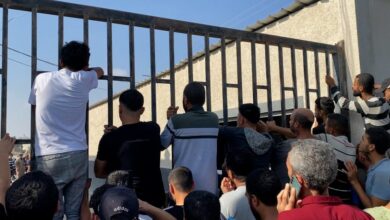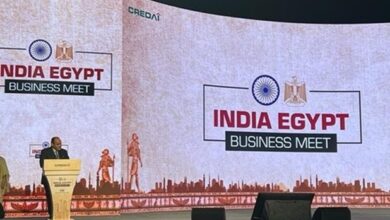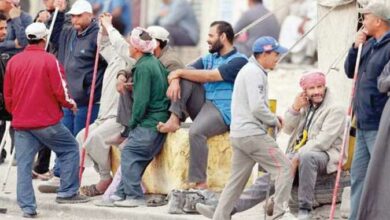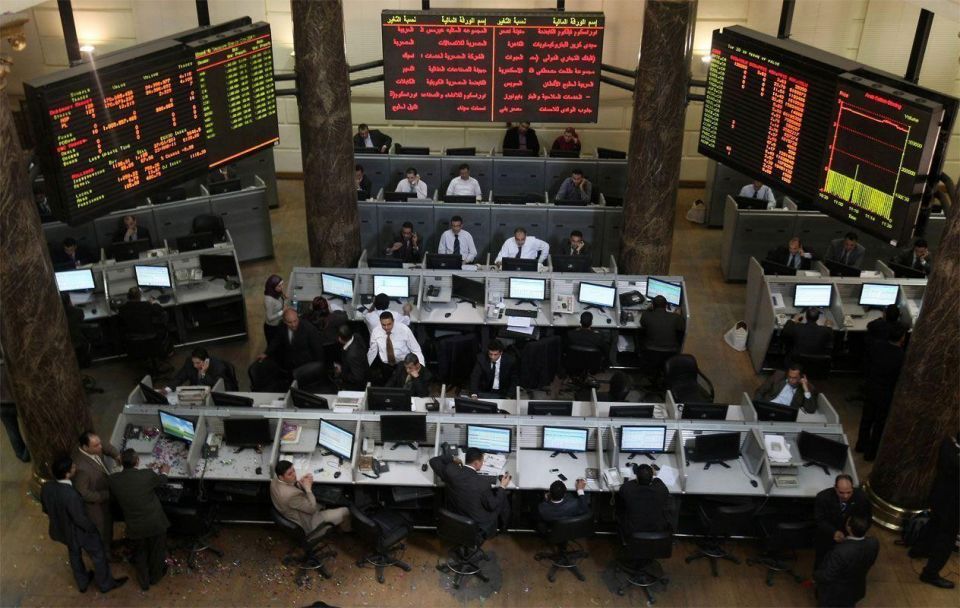Since 2006, Egypt's organized labor force has proven to be the country's most powerful–and vocal–sector of civil society. Although the demands of organized labor and their actions are generally described as apolitical, there are numerous parties and movements vying to mobilize these workers and their unions to serve their own political interests.
Late last month, Hussein Megawer, president of the Egyptian Trade Union Federation (ETUF), announced that nationwide union elections, originally scheduled for next year, would be postponed until 2012 so as not to overlap with Egypt’s 2011 presidential election.
"Our elections must not keep us from supporting President [Hosni] Mubarak, as he is our true supporter, and we are his supporters,” Megawer, an MP for Mubarak’s ruling National Democratic Party (NDP), said. “We will continue supporting him as long as he is able to continue giving." He added: "We will not accept anyone else."
The 82-year-old Mubarak, however, has not officially announced whether or not he would seek a sixth term in office. ETUF elections are, according to Article 41 of Trade Union Law 35/1976, to be conducted once every five years. Therefore, an act of parliament would be required to put the elections off for a year.
Kamal Abbas, director of the independent Center for Trade Union and Workers' Services, said that the postponement of trade union elections would “serve to decrease the accountability of workers' representatives and trade union officials."
During the tenures of presidents Gamal Abdel Nasser and Anwar Sadat, trade union elections had been held once every three years, then, later, every four years. And with the enactment of law 35 in 1976, it was stipulated that elections be conducted once every five years.
"Now these government officials want to hold elections once every six years," said Abbas. Abbas went on to describe the ETUF as "a governmental institution, not a federation of genuine trade unions. Nor does it represent Egypt's workers in any way."
He pointed to the fact that Sayyed Rashid, the previous ETUF president, had "pledged the support of Egypt's 17 million workers for the election of Mubarak in 2005.” Rashid’s announcement, Abbas noted, “was widely criticized at the time by independent and opposition forces throughout the country."
Abbas argued that Megawer was playing the same game–namely, mobilizing Egypt's workers for the sake of the ruling party and its president. He claimed the idea to delay ETUF elections had come from Mohamed Wahballah, president of the General Union of Commerce Workers.
Wahballah, also an NDP member, told Al-Masry Al-Youm that the ETUF was “totally independent,” and was “not a governmental apparatus in any way." He refuted the claim that the initiative to postpone elections was his. "It was not my idea, but rather that of Hussein Megawer, in order to return the favor to President Mubarak,” he said.
“But I do support Megawer's decision." “We support Mubarak not because he is the head of the ruling party or the head of state, but because he is the foremost advocate of workers’ rights," he added.
According to Wahballah, "Workers are free to vote for any worker they chose, but the majority of workers will vote for the president, since they know that he is on their side; that their concerns are his concerns."
Wahballah went on to highlight the fact that, when constitutional amendments were made in 2007, "President Mubarak insisted on keeping the 50-percent quota in parliament for workers and farmers," as stipulated in Article 87 of the national charter. "This proves that the president is keen on protecting the rights of workers and lower-income brackets." The ETUF is also said to be mobilizing workers ahead of nationwide parliamentary elections scheduled for 28 November.
Kamal al-Fayoumi, an unaffiliated worker-activist at the state-owned Mahalla Textile Company, said that the ETUF and businessmen would often "mobilize and bus in their workers to polling stations en masse." He added, "This occurs not only during elections to the People's Assembly, but also during presidential elections, Shura Council elections, and municipal council elections."
He clarified that such mobilization took place not only at the Mahalla Textile Company, but at nearly all other companies and factories throughout the country. "During these elections, short-sighted workers are lured with free meals and bonuses offered by their employers, while other workers–who are more aware of their rights–look at the long-term benefits," said Fayoumi.
He claimed that opportunistic businessmen and trade union officials typically made empty promises and baseless claims regarding their alleged championing of workers' causes. Fayoumi called for a policy of “selective boycotting," whereby workers would boycott the candidates and businessmen responsible for vote-rigging, ballot-buying, and other forms of electoral fraud.
"We should never support the candidacies of businessmen who offer us a free meal and LE50 to vote for them," he said. "Once they are elected, these so-called representatives become unreachable and unaccountable. They end up serving their own business interests at the expense of workers' rights.”
According to Abbas, it is not only workers who are bused in to polling stations. “Businessmen, regardless of their political affiliations, try to bus in all the lower-income people in their constituency," he said.
According to Wahballah, most workers are acutely aware of their rights. “They won't give up their vote in exchange for a sandwich or a bonus,” he said. “They are more intelligent than that." Nevertheless, he argued that, "Our [trade union] elections must be delayed for a year. Otherwise, we would be consumed with our own elections and not available to vote in decisive presidential elections." He openly stated: "We must mobilize workers to vote for Mubarak, since he is the champion of workers’ rights."
When asked why trade union elections can’t be held ahead of schedule, Wahballah replied: "Some people in the ETUF are calling to keep elections at every five years, while some want to make it every six years. Some want elections to be held ahead of schedule, but most want to keep them after the presidential election.”
"In any case, the issue will be discussed and put before a vote in parliament,” he added. “The only problem with conducting elections every six years is that they will continue to overlap with the upcoming presidential poll." He expects the new parliament to approve the delay of trade union elections until 2012.
The ETUF is the country's sole trade union confederation. Its elections are indirect. Workers are only allowed to vote for their local trade union committees (of which there are around 2,000 nationwide.) Workers are not entitled to vote for the representatives of the 24 general union councils that preside over local committees. Of these general union councils, 22 are headed up by NDP members.
Nevertheless, 27,000 employees of the Real Estate Tax Authority from across the country managed to break off from the ETUF and establish their own federation in January of last year. The move effectively created Egypt’s first independent union since 1957.




